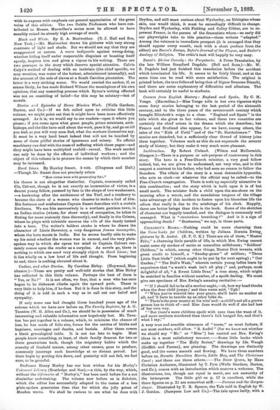Black and White. By E. A. Meriwether. (E. J. Hall
and Son, New York.)—Mr. Meriwether draws his pictures with very strong contrasts of light and shade. But we should not say that they are exaggerated or untrue. A mem& indignatio against wrong-doing, whether hiding itself under respectable disguises or boasting itself openly, inspires him and gives a vigour to his writing. There are two passages in the story which deserve special attention. Calvin Calyx's method of dealing with an inebriate (the chief specific, we may mention, was water of the hottest, administered internally), and the account of the sale of slaves at a South Carolina plantation. The latter is a very striking scene. We would remind the author, if, as seems likely, he has made Richard Wilmer the mouthpiece of his own opinions, that any unsettling process which Byron's writing effected was not an unsettling of belief—for this may be salutary—but of morals.






































 Previous page
Previous page